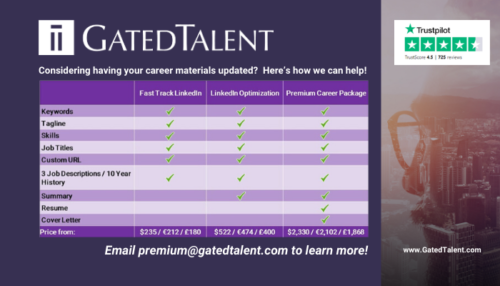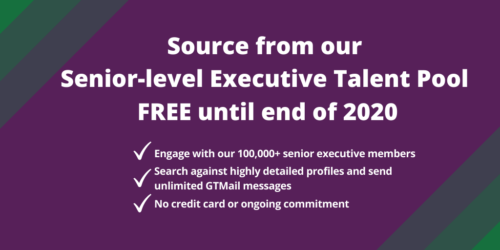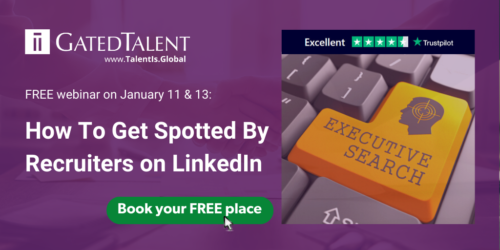At GatedTalent, we regularly host webinars from Executive Search professionals, offering advice to our members on how to get “on the radar” for an executive search, and what to expect as they go through the process. Later in the summer, we’ll be hearing from Bob Olin, an experienced Executive Research leader from Finland to make the launch of his new book – “How to Recognise Excellence in Executive Search” – which talks about the executive search industry.
To whet the appetite, we sat down with Bob and asked him to talk to us about his life in Executive Search and share some of the ideas from his book.
Can you talk us through your career, Bob?
When I was 16 years old, my dream was to become a biologist, but as it turned out, I eventually graduated from Business School. I could early on envisage myself on a life-long career path within HRM. Fate had other plans. After graduating, I started my career as a Business Controller, eventually becoming Department Manager. I was responsible for the business control activities and the self-cost calculation in an international Transport Company, where I worked for seven years. It was an interesting job in its own right and a good company, but I still longed for a job in HR.
I was then headhunted into the Executive Search Industry, (a well-fitting career move for someone writing a book about executive search, I think!) where I then worked for over 32 years. Finally, I was where I wanted to be, not exactly in HR, but close enough. I started in Executive Search as a Search Consultant but soon became more and more involved in Research. Eventually, I jumped over the aisle into the Research Function and became a full-time Research Manager. I never had to regret this move.
For the last 21 years of my career, I was Research Manager in one of the world’s top ten leading global Executive Search Firms, located in Helsinki. I went to work there because I felt this company had the potential to give me everything I wanted and for 21 years it did. After 1,000 Executive Search assignments and 32 years in the Executive Search industry, I can tell you that I could not have wished for a more interesting, challenging and rewarding career. Fantastic days.
Of course, it is good to remember that any career lasting 32 years, in any industry, also has some rainy days. When you feel that you have done your very best, when you have tried every trick in the book and not getting there. But, a top-level headhunter always knows that the winning candidate is out there somewhere and never gives up. You just have to find him/her. If you are a top-level headhunter, you always will. And a satisfied and happy client always makes every effort worthwhile.
Perhaps you could share examples of a couple of memorable executive searches that you have been involved in?
There is one experience I would like to share with you, a search assignment I had at the beginning of my career. Certain memories stick like glue. This is one of them. This story also illustrates how different Executive Search could be in those days without the internet information sources.
I got a visit from the CEO of a Swedish software company, who was looking for a new Country Manager for Finland. It was instantly evident that this was way out of my area of expertise, and I realised, almost an impossible Search Assignment for anyone, even if you had the expertise needed. So, I said that I had to decline because I could not promise him that I would succeed with this Search Assignment and that such a starting point would not be in his best interest. I advised him to contact some Search Consultants that I knew had more expertise in this product. He thanked me for my honesty and left. Imagine my surprise when two weeks later he was back in my room and wanted to give me the Search Assignment.
He had visited the other Search Consultants. Every one of them had said that this Search Assignment was a piece of cake. However, he did not believe in their “Client Promises”. He thought that I was the only one telling him the truth. I reminded him that I still could not promise with certainty that I would succeed no matter what I did. He was perfectly comfortable with this as long as I just gave it my best try. Odd bedfellows we were. The only thing I had going for me was his trust in me. I could not ask him to leave because now he had no one else to turn to anymore so, I agreed to take the assignment.
The Search proved to be just as tricky as I had imagined. I learned that only five companies in Finland sold this product. All small international subsidiaries that employed 1 to 4 persons each. Getting any information about the companies or their personnel was impossible. Neither was there anyone I could have asked for help. No one else knew anything either.
Then I got a lucky break. The five companies were about to hold a fair about just this product. It was exclusively for their Clients, but I managed to squeeze myself in. The only strategy I had was that I would sneak around in the crowd and try to get close enough to the company stands so that I could read the name tags of the salespersons. How’s that for a strategy? Well, nothing else was available.
It worked very well for the first three stands. It was so crowded that no one paid any attention to me. At the fourth stand, I caught the eye of the sales manager who approached me thinking I was a potential customer. It instantly became clear that I did not know a thing about his product, and he wondered what I was doing there. Surrounded by a crowd as I was, I could not just tell him I was a headhunter. I tried to say something intelligent without succeeding very well. I am certain that he and all the people in the crowd that could hear me, thought I was an idiot, and I felt like one too. I could not stay there, so I thanked him and moved on.
I felt sick to my stomach after this experience, but I had to go on because I had promised my Client to do my best. Finally, I had got all the names I wanted. The next day I called all the persons on my list. In the end only one was interested, but he was good. He knew the product well, which was good news. There was a downside too, he did not speak English well enough, which was another key requirement. However, he promised to improve his English within three months. I had a good feeling about this guy, and I believed him, so I called my Client. I told him that I had a Candidate with excellent professional expertise, but with poor English skills.
Then I put myself on the line and said, you trusted me to give me this Search Assignment, so now trust me one more time. Come and meet this guy and I promise you will not regret it. So, he came. It was the strangest interview I have ever attended. I acted as an interpreter the whole way through. Even so, my Client said he was impressed by the Candidate and wanted to meet him again. He had one condition though. If he was going to hire the Candidate, he had to learn English well. They met again three weeks later. The Candidate was worthy of his promise. He had attended a crash course in English and in only three weeks he had learned enough to be able to communicate entirely on his own in the interview. He was hired.
Five years later I met this Nordic CEO at a business event. He said this was the best hire he had ever made. The moral of this story: Always be honest with your client. He/she wants to hear the truth, even should he/she not like it, not sweet promises you cannot keep. Never abandon your client when he/she needs you. Never give up. Believe in yourself.
Your book talks about “Pre-Emptive Executive Search”. Can you tell us more about this?
I have over the years often experienced a situation, where the Client seemed very surprised and unprepared when suddenly losing a key executive, this causing the Client serious business problems. I could not help wondering if there was anything I could do to help. My starting point is:
Recruiting a key executive is never a routine thing, not even at the best of times.
Finding a top-level Executive Search Firm is neither a routine thing. Not all Firms are top-level just because they say they are. Whether you chose right or wrong has consequences.
This is not just about a recruiting assignment. You are choosing a strategic business partner.
Pre-emptive Executive Search is about preparing yourself for sudden unexpected future recruiting needs, where you go to great lengths to prepare yourself in advance. All through the ages, companies have tried their best to manage their resource planning and recruitment, to ensure they have adequate and right resourcing in all situations. I am not inventing anything new here. I am just taking up some issues I feel are worth paying attention to.
The focus in my Pre-emptive Executive Search is explicitly on unexpected and sudden losses of senior key executives of strategic importance. I emphasise that I am talking about extraordinary potential key executives possessing some unique professional skill set. Be it management or leadership skills, technological expertise, market experience, a unique understanding of some industry ecosystem or simultaneously a combination of these. A skill set a company just cannot be without.
An Executive Search Process including the notice period can easily take 6-8 months before the new person is aboard. Any unexpected delays in the recruiting process can be business critical. Some examples of what you can do in advance:
- You should, e.g. regularly check that all important recruiting related documentations are up-to-date and in tune with reality. Documents like the Company Presentation, Organization Charts, Job Descriptions, Job Profiles and Job Requirements should always be up-to-date in real time.
- The Job Description should also include a brief description of a typical day/month/year on the job. Use of time in general. Who are the key stakeholders, superiors, colleagues, subordinates, customers? Issues like Unique Selling Points, and significant internal/external challenges the incumbent will face. Also, a market presentation and of course what is expected in the job. Starting to think about this only after a key executive has quit is bad practise.
- You should also decide on: How to start the search process. How to choose the Executive Search Firm. Who’s in charge, the milestones, the timetable. If person number one in charge is unavailable, decide who the stand-in is. How to manage the search process steps. Should the Company keep back and wait for the Search Firm to report or have a regular interactive contact? Is there anything we as a Client can do to help? Do we have any benchmark names, search ideas, company target list ideas we could give to the Search Firm? How will the Client interviews be conducted? How will the reference checks be conducted, by whom? And so on……
Starting and managing an Executive Search process requires much more attention, interest, actions and time than many think. It is not just about calling a Search Firm and giving it a Search Assignment. You should find out who’s who in the Executive Search Industry and then meet and check out the Search Firms/Search Consultants in advance. When your company eventually needs to contact a Search Firm, don’t think they are just waiting for you and can start the same day. They cannot for sure, whatever they may say. Your company is not its only Client. There is much more to this subject than meets the eye. In my book, I talk about Pre-emptive Executive Search for nearly 20 pages.
How has the executive search changed? How do you see it changing in the future?
Thirty years ago, the world was very different. For starters: no fancy databases, no internet, no email, no SMS. The only thing you could do with your phone was to make a call. When you called a Candidate, many did not even know what Executive Search was. Everything was done manually. The candidates sent us their CVs by mail which were then stored in folders. If we wanted to find some information, we had to rely on printed information sources and our trusted people sources. There were probably a hundred other things too that were different.
The single most significant factor that has changed our everyday way of working, compared to yesterday, is the technological change, our IT systems, the internet, social media, online databases like LinkedIn and GatedTalent, mobile technology. The digital revolution affects everything we do.
The competition in Executive Search is today much fiercer. Nowadays, many companies specialising only in Research exist in the Executive Search Industry. Our Clients have become more knowledgeable and more demanding and their businesses more complex, more international, more global. So has the Executive Search Industry.
The job of the Search Consultant has become much more demanding and hectic, likewise the job of the Researcher. No more is the Researcher a person who “just” sits at his table doing desk-research. Today a top-level Researcher must have the habitus, the intelligence, the professional expertise, the communication skills and credibility to be able to stand in front of any CEO of a global market leading company and be able to convince that CEO that his/her firm can do the job.
The ever faster-changing technology has fundamentally changed how we behave. How we find and contact people. Even our values have been changed. We are connected to the world 24/7, whether we want it or not. Today, you can access enormous amounts of data with just a click of a mouse. We are becoming overwhelmed with information to the extent that we are losing our ability to understand what is essential and what is not. What is real information and what is not? Most Search Firms are using LinkedIn as a major information source. Nothing wrong with that, but if one 500-million people database becomes your only search strategy, you are in dangerous waters.
Senior Level Executive Search is not in the half-billion-people database business. Simply put: we are looking for just one person for only one position. This first translates into a target industry/target company list. Then into a long-list of maybe 50 persons. Then into a short-list of 4-6 persons and finally into only one winning Candidate. In a Search for a world-class CEO for a market leader company, a 500-million-person database should never be the only information source.
That said, we should, of course, take advantage of the benefits LinkedIn may offer. But we should also pay attention to databases like, e.g. GatedTalent – a leading platform connecting executives to executive recruiters worldwide – and equally make it a standard checkpoint in the Search Assignment research, just like LinkedIn is today. Already more than 200 Executive Search firms have signed up to use GatedTalent. There is no 100% guarantee that you always find your winning candidate here, but in a database with a highly senior-level and strongly growing talent pool, with Executives from 90 countries – CEO being the most common job title – the likelihood of doing so is better.
Also, if you are a Senior Executive who wants to be on the radar of global Executive Search firms and want to maximise your chance of being found, by putting in your information in GatedTalent you can simultaneously reach out to over 200 Executive Search Firms. Also, now you are not one candidate among 500 million candidates, so your chances of getting a “hit” are way better.
As far as the future is concerned, we now live in a faster world, with fewer boundaries and as it feels almost limitless possibilities. The development in technology is creating a landscape where only the imagination seems to limit what products and services are being created. Person to person networking seems to be moving more and more into the Internet. Losing personal people contacts to technology is not a good thing. You do not create deep, confidential and trusted business relationships in the business world without ever meeting your counterpart in person. The single factor that will likely have the biggest impact on the future is AI. AI may indeed be an excellent servant if we get everything right. However, if we get it wrong, AI may develop into a dangerous master. Only the future will show if we did things wisely or unwisely.
Your book gives advice to executives who are in the process of a career change. What is the most important thing for them to know?
The best way to learn this would be to read my book. However, that is 272 pages, not enough room for that here, so I will here only briefly comment on three important points.
Make certain you know why you want to change jobs!
The cover letter, the CV – they are your blueprint – get them right!
When going to the interview – what to do!
Make certain you know why you want to change jobs! Today, meeting a headhunter seems to be a routine step in everyone’s career action plan. It is important that you develop an accurate understanding of your situation and can come to terms with the real reason. The why’s and how’s will affect the way you move on from here. You can’t just look for a new job at random, or with an attitude that everything goes.
The better you do your analysis, the better you can envisage what the next job you would like to land, looks like. It is also important to know, that whatever job it is we would like to get the next time, we want it for the right reasons. Any headhunter or hiring manager you eventually meet in the future, will in a manner of speech, do a due diligence of you in their interview. Why not do it yourself in advance? It will help you see things clearer! You are in a much better position to analyse and understand the challenges, opportunities, also the potential risks in any given job opportunity.
The cover letter, the CV – they are your blueprint – get them right! There is no shortage of examples on the internet of how to make a CV or a cover letter. Nothing wrong in having a look at the internet or asking others for advice. But in the end, only you can ensure that the structure and content of your documents are in tune with your situation, your career history and your personality. Don’t write a CV describing a superman, just an accurate summary of yourself. Superman is seldom the best choice for any job. Never lie in your CV. If you get caught, it may destroy your entire career.
In the cover letter, the focus is on you as a person, your characteristics, your values, thoughts and career aspirations. What you are like a person, what motivates you, what not. What are your goals. In the cover letter, you can and should try to add a personal touch to how you tell about yourself.
A CV is a summary of information related to your professional career, expertise and achievements. It should be concise, clear, grammatically correct, and contain important and essential career-related information. Don’t assume everyone is familiar with your previous employers. Give a short summary-like description of your employer with the essential company information. If this is your first time writing a CV or if it feels difficult, ask someone to help you. Always ask for feedback. We tend to be so fond of our doings that our perspective may become biased. Never just copy-paste the information from a company job description. A CV should always be custom made in your own words.
When going to the interview – what to do! People sometimes wonder how they should behave. That is easy. Just remember what your parents used to say when teaching you good manners: dress appropriately. Have clean and tidy clothes. Have a firm handshake. Talk with a clear voice. Look people in the eyes. Be positive, respectful, polite and friendly, never arrogant, to everyone you meet. Have opinions but always be constructive. Never brag. Never badmouth people. Be on time, not too early or too late. All this is called good behaviour.
Always do your homework about the subject of the meeting. You know this will show and have a positive impact on the interview. The interviewer will pay attention to if you have and if you have not. Moreover, very important, be yourself, be authentic, you will feel much more comfortable and confident in being yourself, instead of pretending to be something you are not. Also, if you are very good at pretending to be something you are not, this might land you a job you do not like at all.
Sure, the headhunter will ask you many questions, and some of them may feel tough indeed, some even difficult to answer. However, this is what the headhunter is supposed to do. How can the headhunter otherwise get acquainted with you and learn to know what interests you and what does not. This is nothing to feel nervous or uncomfortable about. This is also the very reason why you went to meet the headhunter in the first place, for the headhunter to get to know you. The more the headhunter asks you questions, the easier it will be to recognise a Search Assignment that fits your profile when it one day drops in through the Head Hunter’s door.
Thanks, Bob.
If you would like to learn more about Bob’s book – “How to recognise excellent in Executive Search” – you can do so here: www.camdenpoint.fi.
Join GatedTalent Now!
Thank you
We have sent a verification link to your email. Please follow the instructions to activate your account.












